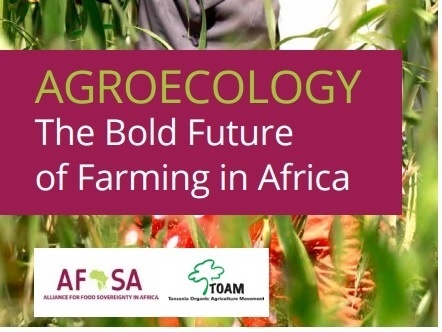FreeBook: Agroecology : The Bold Future of Farming in Africa


(The book: Agroecology: the bold future of farming in Africa)
This free publication examines pathways to sustainable, productive farming, including agroecology in Africa and examples from our global agricultural heritage.
“If anyone still entertained doubts as to the benefits of agroecology and as to whether it can meet the challenges of this century, this collection of essays provides a compelling answer”, - Olivier De Schutter, Co-Chair of IPES-Food and Former, UN Special Rapporteur on the Right to Food. |
Agroecology is taking off worldwide. The FAO of the United Nations has recently opened an online Agroecology Knowledge Hub portal dedicated to agroecology, along with an online discussion forum on Sustainable Farming through agroecology.
Agroecology has been the bedrock of traditional agricultural systems around the world, but being adaptable to socio-economic and environmental changes is essential for such systems to persist. Achieving sustainability in agricultural systems demands a respect for diversity, encouraging broader thinking about solutions and providing political support for farmers to make choices.
The 15 case studies in Agroecology – The Bold Future of Farming in Africa - produced by the Alliance for Food Sovereignty in Africa (AFSA) Agroecology Working Group and Tanzania Organic Agriculture Movement - :
|
Diversification, typically through mixed cropping, agroforestry and integration of livestock, is central. Through such interactions, biological processes are optimised, whether by nutrient recycling, nitrogen fixation or biological pest control.
Introducing or promoting technologies to smallholders is not enough for agroecology to flourish. Farmers also need access to land, seed, water, credit and local markets; supportive economic policies, financial incentives and market opportunities are a vital part of the picture.
The publication highlights experiences ranging from the orange-fleshed sweet potato that brings health and livelihood in Ghana, to reviving the climate resilient Ankole longhorn cattle in Uganda, and reclaiming life in fragile ecosystems through innovative solutions in Burkina Faso. With the concept of food sovereignty at its core, the book demonstrates that agroecology creates just food systems, cuts greenhouse gases and environmental degradation and provides a sustainable future for us all. The book calls for no less than a complete transformation of current agricultural and food systems. |
Agroecology: The Bold Future of Farming in Africa |
For further information please contact:
Michael Farrelly – Tanzania Organic Agriculture Movement ([email protected])
Million Belay – Alliance for Food Sovereignty in Africa ([email protected] or [email protected])
Source: AGROECOLOGY: the bold future of farming in Africa (ASFA)
_________________________________________________________________________________________________
Related content:
- Pathways to Sustainable Agriculture FreeBook (Routletge, 2017)
- Sustainable farming: Shifting the centre of gravity in food (CTA Spore, 2016)
- Agroecological farming: should we be going back to basics? (AIMS, 2016)
- African Biodiversity Network (ABN)
- The East African Organic Products Standards
- Agroecologiki SP as an SME works on research & development for sustainability solutions in agriculture through applied research, agricultural training and consultancy

